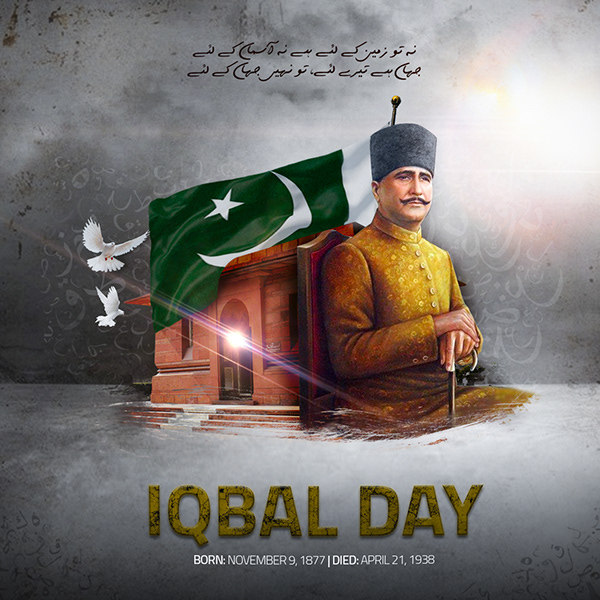

IQBAL DAY
Pakistan observes Iqbal Day every year on November 9, celebrating the politician, poet, and philosopher Muhammad Iqbal. Credited with developing the concept of Pakistan, his poetry is commemorated across the country through loud readings. Iqbal’s verses carry messages of inspiration, hope, and change, making it a shared responsibility to act on his vision of a better future. Let’s honor Iqbal by remembering him, working towards realizing his vision, and sharing our thoughts about the world.
Allama Muhammad Iqbal
Allama Muhammad Iqbal, born in British India in 1877, was a politician, poet, and philosopher. Many people regard him as Pakistan’s moral father. His poetry and philosophy served as a wellspring of inspiration for the Pakistan Movement, which began in the 1940s and culminated in the establishment of the modern state of Pakistan in 1947. In Pakistan, he is known by various titles such as Mufakkir-e-Pakistan, “The Thinker of Pakistan,” Shair-e-Mashriq, “The Poet of the East,” and Hakeem-ul-Ummat, “The Scholar of the Ummah.”
Iqbal advocated for the creation of an independent Muslim state within India and is credited with coining the term “Islamic socialism.” Pakistan commemorates Iqbal Day as a national holiday, honoring the philosopher, poet, and politician who is considered one of the most significant figures in Urdu literature. To mark the occasion, activities such as speeches, poetry recitations, and other cultural events are organized.
Childhood and Education
Born on November 9, 1877, in Sialkot, which is now part of Pakistan but was originally part of British India, Allama Iqbal grew up in a religious Muslim household and hailed from a Kashmiri family. Displaying intelligence from an early age, he showed exceptional aptitude in his studies, particularly in literature and language. After completing his primary education in Sialkot, he enrolled at Government College, Lahore, where he pursued philosophy. Transitioning from a remarkably talented student to a teaching role at the college, Iqbal’s journey continued to unfold.
Higher Education and Career Success
Allama Iqbal pursued further studies in Europe, where he earned a degree in philosophy from the University of London in 1907. Subsequently, he obtained his PhD in philosophy from the University of Munich, Germany, in 1908. While residing in Europe, Iqbal absorbed significant influences from Western philosophical thought. However, he also keenly observed the challenges confronting Muslims globally.
Literary and Philosophical Contributions
Allama Iqbal’s poetic and philosophical writings serve as a solid foundation for delving into his personal discoveries. Notably, he stressed the significance of spiritual awakening and self-awareness. Furthermore, his poetry, written in Persian and Urdu, delved into complex themes such as spiritual awakening, freedom, and harmony, earning him immense fame. Consequently, works such as “Asrar-e-Khudi,” “Bang-e-Dra,” and “Payam-e-Mashrik” stand out among his notable contributions.
Standing in Pakistan Team
Allama Iqbal’s poetry and speeches had a profound impact on Muslims in the Indian subcontinent. Consequently, he is frequently acknowledged for inspiring the Pakistan movement with his scientific and philosophical ideas. In his vision of an ideal Muslim state, Muslims would have the freedom to uphold their faith and culture. Notably, he underscored the necessity for an independent Muslim state in his renowned speech at Allahabad in 1930. Following the establishment of Pakistan in 1947, Iqbal’s aspirations for development finally materialized.
Later Life and Gifts
After holding the position of Head of the Department of Philosophy at Punjab University, Allama Iqbal transitioned to become a Professor of Philosophy at Government College, Lahore. Furthermore, he actively joined the All India Muslim League and emerged as a prominent political figure. However, on April 21, 1938, Allama Iqbal passed away in Lahore, Pakistan, leaving behind a substantial collection of poetic and philosophical writings. Consequently, he is revered as a visionary poet and philosopher whose teachings on self-empowerment and the vision of a free and just society have ignited inspiration in generations of people. Notably, on Iqbal Day, a national holiday in Pakistan, individuals commemorate the accomplishments of Allama Iqbal because his poetry and ideas have stirred and galvanized the nation.
Poetry of Allama Muhammad Iqbal
Known by the pen name “Iqbal,” Allama Muhammad Iqbal is renowned for his intricate and evocative poetry. Furthermore, his poetic compositions brim with philosophical depth, exquisite imagery, and profound meaning. Here are a few selected poems:
"Khudi": (real hood)
“Khudi ko kar buland itna, ke har taqdeer se pehle khuda bande se khud pooche, bata teri raza kya hai.
Being so high that God Himself asks, “What is your will?” before giving any form of government, signifies a state of unparalleled authority and spiritual elevation.
"Lab pe ati hai dua" (it feels like praying)
Lab pe aati hai dua ban ke Tamanna meri zindagi shamma ki sur ho khudaya meri.
Prayer comes to my lips, oh God, as my desire. Consequently, make my life a candle flame, oh Lord.
"Shikwa":( a complaint)
“Khuda ke waste parda na kaabe se uthaa zaalim
Kahin aisa na ho yahan bhi wahi kaafir sanam nikle.”
To prevent the same Kaafir Sanam from being revealed here too. (For heaven’s sake, ruler, do not reveal Kaab’s secret, lest the ignorant man here find love either.)
These examples represent just a fraction of Allama Iqbal’s extensive treasury of poetry. Moreover, his writings span a broad spectrum of themes, encompassing faith, self-awareness, social justice, and the resurgence of Islamic philosophy. Transcending time and space, each verse offers profound insights and serves as a wellspring of inspiration for readers worldwide.
Conclusion
Celebrating the life and achievements of Muhammad Iqbal, whose poetry and writing have generated millions of dollars, underscores the importance of Iqbal Day. Additionally, we can all derive inspiration from Iqbal, whose message of justice and faith remains as relevant now as it was when he first articulated it. On this day, take some time to engage with Iqbal’s life and words, allowing his wisdom to catalyze positive change in your life.
Furthermore, on this day, we have the opportunity to remember and express gratitude for the life and achievements of Muhammad Iqbal, one of Pakistan’s most significant poets and philosophers. Today presents an occasion to contemplate his visions for Pakistan and reaffirm our commitment to align with his ideals. This year, we encourage you to celebrate Iqbal Day by deepening your understanding of his life and principles, and by sharing them with others.
Allama Muhammad Iqbal (1877–1938) stood out as a prominent politician, poet, and philosopher. Additionally, he holds the distinction of being considered the national poet of Pakistan and one of the most significant figures of the Urdu language.
Iqbal’s philosophical poetry is popular, especially for introducing “khudi” or the concept of self. Moreover, through his poetry and philosophical writings, he championed societal change, higher consciousness, and individual freedom.
Persian, Urdu, and English were the three languages of Iqbal. Furthermore, his poems were published in Urdu and Persian. Consequently, his collection of Persian poetry is said to be larger than his collection of Urdu poetry, as his poetry collections in Urdu are very popular in Pakistan, where he is a recognized national poet.
He died on 21 April 1938 in Lahore, British India (now Pakistan).
Popular News


The Story of Black Friday 2024






